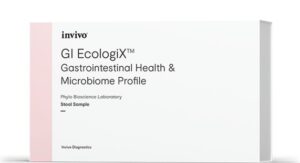There is an abundance of research telling us how important our microbiome is for our health. The collection of good bacteria and the important environment created within our gut plays a huge role in our immune health, mental health, weight management and of course digestion and absorption of all the nutrients we need to get from our food. Learn more about the test here or read more about how we can help digestive problems here
How to keep your microbiome healthy
It has been shown that eating a diverse diet with a range of fruit, vegetables and fibre-rich foods is the best way to maintain a healthy population of ‘good bacteria’. Sometimes the balance can be tipped however, which can easily lead to the destruction of the friendly bacteria. This can happen through the use of antibiotics, steroids, hormone pills and fertility treatment, high alcohol and sugar consumption and even stress. Once large colonies of these friendly bacteria are destroyed you may be vulnerable to infections and problems relating to the proliferation of their unfriendly neighbours.
What’s different about this test?
This test is a very comprehensive analysis of your gut microbiome. The technique used to examine the microbe populations looks for the presence of DNA rather than relying on the growth of the microbes under laboratory conditions. Gut microbes live in a very different environment to that which is replicated in the lab. Many of the bacteria simply will not grow in the presence of oxygen for example. This test acts more like a forensic detective, even traces of DNA can be identified, amplified and accurately quantified. This is cutting edge technology and completely surpasses other stool tests.
What does the test measure?
Bacteria
This test measures good bacteria, bad bacteria and everything in between. Your good bacteria are essential for health and the regulation of your immune system and should be present in good number in order to crowd out the ‘bad guys’. Opportunistic bacteria are those that under normal circumstance will be kept in check by the good bacteria but given a poor gut environment can grow and cause symptoms in some.
This test also looks for known pathogenic bacteria which can cause infections and disease, including Klebsiella, C difficile and Helicobacter pylori. Types of bacteria that are known to be more commonly found in people with autoimmune diseases can also be identified, which may indicate risk of disease. In addition, Akkermansia is quantified; there is much research on the role of this bacteria in our metabolism and weight management. Faecalibacterium prausnitzii is measured which is a critical strain for maintaining the integrity and health of our gut lining. In addition, the overall balance of bacterial families is given, which can be altered in a Western diet or diet high in processed foods and low in diversity.
Yeast
Some yeasts are normal in the gut, but an overgrowth of yeast or different yeast strains might indicate an unfavourable environment and may contribute to symptoms of ‘brain fog’, sugar cravings, bloating and discomfort.
Parasites
Parasites are common and often do not cause us trouble. However, if you have a lowered immune response, a sensitive gut or another infection or overgrowth, it is thought that parasites may cause symptoms in some individuals.
Markers of Digestion
We need to digest our food in order to absorb the critical nutrients it supplies. Faecal elastase is used as a reliable marker of digestive enzyme production and can give information on how you are breaking down your food.
Intestinal Health and Inflammation
Markers of your immune defences and active inflammation are an important component of this comprehensive test. Calprotectin, beta-defensin and secretory IgA levels are measured. Understanding whether you have active inflammation or whether your body is able to fight off bacterial overgrowth or infection is critical to your recovery.
Occult Blood
Occult blood is the detection of blood particles that may be present in the intestine. These may not be detected visually in the stool but represent an important marker of possible damage and inflammation in the digestive tract. If this is raised significantly, you may be referred to your doctor for follow up.
Bile Acids
Bile acids are stored in your gallbladder and are released into your digestive tract to help you break down food and particularly fats. If you have intolerance to high fat foods you might have an issue with bile acid production. Too many bile acids can cause loose stool diarrhoea and bacterial imbalances. Bile in itself however is a normal feature and when you have too little, it can also cause bacterial imbalance and constipation.
Gut permeability or ‘leaky gut’
Zonulin is a marker of increased gut permeability, commonly referred to as leaky gut. When the integrity of the gut lining is damaged, immune reactions can be triggered which lead to inflammation linked with various conditions such as autoimmune conditions, fatty liver disease and mental health issues. This is often a ‘root cause’ of perceived food intolerances. Improving gut health and restoring the health of the lining can be a key step in improving tolerance to foods, reducing immune reactions and reducing symptoms.
Who should take this test? Anyone with any of the following symptoms should take this test:
- Digestive issues incl. reflux, irritated stomach or bowel, distension or bloating, feelings of extreme fullness after eating, cramps, diarrhoea or constipation, fatty or floating stools
- Reactions to foods which may be difficult to pin-point
- Immune-related issues such as skin rashes, unexplained joint or muscle pain or immune-related fertility issues
- Those with a diagnosed autoimmune condition
- Unexplained fatigue, brain fog
- Weight loss-resistance, problems with insulin resistance
If you have ongoing digestive issues and are interested in functional medicine testing: please contact us at clinic@glenvillenutrition.ie or make an enquiry online. We have a number of different tests available and it is most helpful, and cost effective, to carry out an initial assessment with your nutritionist before testing.


